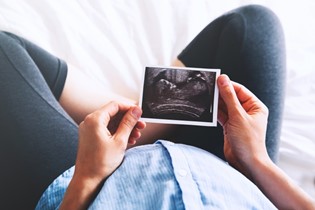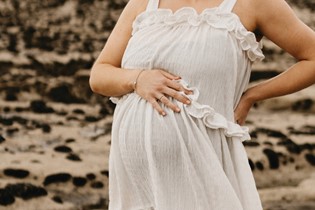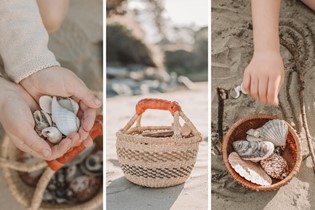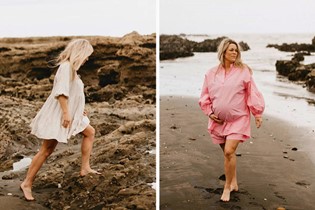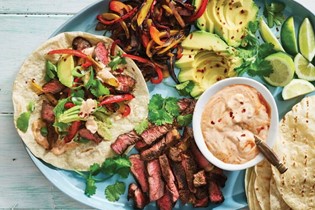First trimester of pregnancy: nutrition

With so much information out there, it can be confusing knowing what you can and can't eat during pregnancy. Here's what you need to know...
The hormone changes in early pregnancy can cause morning sickness and constipation for many women. Morning sickness tends to strike between weeks 7-12 of pregnancy and can make you feel pretty awful. It is perfectly fine to have a more limited diet while you are feeling nauseous; dry plain carbohydrate foods like crackers or toast can be helpful. Keep as much variety in your food intake as you can tolerate, and slowly re-introduce more foods as the sickness eases off. Try a kiwifruit a day if you are struggling with constipation, they are very effective! Include other high fibre foods like fruit, vegetables and grainy/brown carbohydrates along with plenty of water to help fibre works its magic.
In the early stages of pregnancy, a b-vitamin called folate is incredibly important. This is found in leafy, dark green vegetables, oranges, beans and legumes, bananas and fortified food products. Eating more high-folate foods is a great pre pregnancy and first trimester nutrition goal as having enough folate is essential to helping your baby's brain and spinal cord develop properly.
PREGNANCY NUTRITIONAL SUPPLEMENTS
+ Folic acid. Even if you are eating a lot of high folate foods, a folic acid supplement is required for the first three months of pregnancy. In New Zealand, the recommendation is 800 mcg folic acid each day until the end of the first trimester. Some women will require more than this so ask your specialist/dietitian/GP what dose is right for you.
+ Iodine. Iodine is low in NZ and is very important for your baby's brain development. Take a 150mcg iodine supplement each day during pregnancy and continue while breastfeeding too.
+ Iron. As pregnancy progresses, your requirements for iron increase. Iron is essential for both you and your growing baby and it can be hard to get enough, even with an iron-rich diet. If your iron levels are low, a prescription iron supplement will be more effective than a pregnancy multi-vitamin or an over-the-counter iron supplement.
KEEPING SAFE
When you are pregnant, your immunity is lower and you are more at risk of food poisoning. In addition, there are two infections that are particularly dangerous for pregnant women: listeria and toxoplasmosis. It is really important to follow the food safety guidelines in pregnancy – in extreme cases, harmful bacteria in food can cause miscarriage, illness or the death of your baby.
Food safety recommendations need to be followed for your whole pregnancy, not just during the first trimester.
+ Listeria. Listeria is a common environmental bacteria found in soil, animal faeces, on plants and in water. It can be found in raw foods, or it can contaminate prepared foods. Listeria is unusual because it can grow on food in the fridge (ie at cold temperatures). Listeriosis is the disease caused by listeria and this can cause miscarriage, premature labour, or your baby to be born with listeriosis.
+ Toxoplasma. Toxoplasma is found in soil, cat faeces or direct contact with cats. It can also be on/in unwashed vegetables, raw milk, and undercooked or cured meats. A toxoplasmosis infection puts your unborn baby at risk of eye or brain damage. Avoid these foods and practise good hand hygiene, particularly around pets/animals.
WHAT ABOUT MERCURY AND CADMIUM IN FISH AND SEAFOOD?
Mercury is a natural chemical in seawater, so all fish contain some. The benefits of consuming fish in pregnancy far outweigh any concerns about mercury content. Fish is a great source of protein, low in saturated (unhealthy) fat, and contains essential omega-3 fats. Keep the amount of mercury you consume in pregnancy low by eating fish species with lower levels and choosing a variety of different fish. Most commonly eaten fish in New Zealand can be eaten freely. Higher mercury levels tend to be found in large, long-lived fish species like marlin, swordfish and Southern bluefin tuna (not the type used in canned tuna). For shellfish with higher levels of cadmium, it is recommended to eat these once a month or less during pregnancy. This includes Bluff and Pacific oysters, and Queen scallops.
ARE HERBS SAFE IN PREGNANCY?
Most herbs are fine to use in regular amounts in cooking, make sure to wash fresh herbs well before use. Sage, rosemary, garlic, ginger, turmeric and asafetida are not recommended in high concentrations/medicinal doses in pregnancy, though they are considered safe in usual amounts in cooking.
Some herbal teas are best avoided too, such as chamomile and alpine tea. Red raspberry leaf tea should be one cup or less in the first trimester. Ginger, citrus peel, peppermint, echinacea and rosehip tea are okay for 2-3 cups per day in pregnancy.
FOODS TO AVOID DURING PREGNANCY
+ Cold ready-to-eat foods like deli meats and café/restaurant salads
+ Chilled pre-prepared meals (eg uncooked sandwiches*, sushi)
+ Raw (unpasteurised) milk and raw dairy products
+ Soft pastuerised cheeses*
+ Unheated leftovers*
+ Raw or smoked fish and seafood*
+ Cold processed meats (eg ham, salami, pâté, dried meats)*
+ Raw or undercooked meats
+ Cold or smoked chicken*
+ Stuffing from roast chicken/turkey (unless cooked separately)
+ Raw eggs (including in mayonnaise/aioli, tiramisu, mousse)
+ Soft-serve ice cream
+ Cream or custard in bakery products (okay if freshly homemade)
+ Tahini (and hummus if it contains tahini)
+ Raw/unpasteurised drinks
+ Sprouts (eg mung bean, snow pea, alfalfa)*
+ Uncooked frozen foods like frozen vegetables or frozen berries*
+ Brown seaweeds (these can be too high in iodine, once a week or less is okay)
* These items can be safely eaten in pregnancy if they are heated until piping hot (>70°C).
SO, WHAT CAN YOU EAT?
Don't worry – there are still plenty of foods that are safe and healthy choices in pregnancy.
+ Fresh home-cooked meals
+ Super-hot leftovers (within two days of being made)
+ Pasteurised milk and dairy products (within best-before date)
+ Hot soup with toast/toasted sandwich/toast with preserves
+ Commercially manufactured dressings, tomato sauce and mayonnaise
+ Regular block cheeses, butter, margarine, freshly opened cream, packaged ice cream
+ Fruit (wash and dry well just before eating)
+ Vegetables (wash thoroughly, dry them well too if eating raw, no sprouts)
+ Well-cooked and hot eggs
+ Well-cooked and hot meat, chicken, fish
+ Vegetarian protein foods (eg lentils, chickpeas, beans, peas, tofu, nuts, seeds)
+ Bread, plain cake/muffin/slice, breakfast cereals
+ Canned foods
+ Green seaweed (nori)
Alice Gormack specialises in nutrition for conception and pregnancy, and has been working as the Fertility Associates dietitian since 2013.

AS FEATURED IN ISSUE 64 OF OHbaby! MAGAZINE. CHECK OUT OTHER ARTICLES IN THIS ISSUE BELOW


